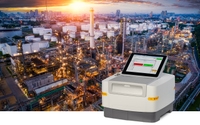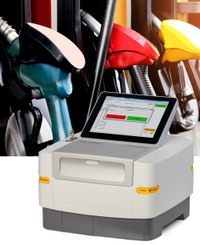Analysis you can trust
Fuel analyzers are specialized instruments used to measure the physical and chemical properties of various types of fuels. They work by analyzing a small sample of the fuel using various methods, such as X-ray fluorescence (XRF), Fourier-transform infrared (FTIR) spectroscopy, Ultra Violet Fluorescence (UVF) Spectroscopy, or gas chromatography (GC). The results of the analysis can then be used to optimize fuel production processes, ensure fuel quality, and comply with regulations.
There are several types of fuel analyzers available on the market, each with its own strengths and weaknesses. Some common types include XRF analyzers, FTIR analyzers, UFV analyzers, GC analyzers, and portable analyzers.
Our fuel analyzers are designed to meet the unique needs of the fuel industry, from refineries and petrochemical plants to independent testing labs and research facilities. We offer a range of fuel analyzers, including the Epsilon 1 Sulfur in fuels analyzer and the Epsilon 1 for ultra-low sulfur analyzer.

The Epsilon 1 Sulfur in fuels analyzer is a powerful and versatile tool for measuring important chemical elements like sulfur content in a wide range of fuels, including gasoline, diesel, and marine fuels. It uses energy-dispersive X-ray fluorescence (EDXRF) technology to provide fast and accurate results, with a detection limit as low as 10 mg/kg or 10 parts per million (ppm) sulfur.
The analyzer is equipped with a dedicated 15 Watt powered vanadium anode X-ray tube and a high-resolution detector, enabling it to analyze samples with high performance and sensitivity. It also features a user-friendly interface and easy-to-use software for data analysis and reporting to Epsilon 1 ULS.
Our Epsilon 1 for ultra-low sulfur analyzer, on the other hand, is also specifically designed for measuring ultra-low levels of sulfur in diesel, gasoline, and other fuels. It uses energy-dispersive X-ray fluorescence (EDXRF) technology to detect sulfur and other elements with high precision and sensitivity, with a detection limit as low as 0.5 ppm. It is equipped with a high-performance X-ray tube and detector, as well as advanced signal processing algorithms for enhanced accuracy and reliability. It also features a compact and lightweight design, making it easy to transport and use in the field. The configuration of the Epsilon 1 ULS allows detection of sulfur on very low levels, normally only achievable when using helium as a measurement medium - this is not needed anymore. The low detection limits allow the Epsilon 1 ULS to achieve the most stringent requirements like ISO 13032 with respect to detection, repeatability and reproducibility.
Both the Epsilon 1 Sulfur in fuels analyzer and the Epsilon 1 for ultra-low sulfur analyzer offer many benefits to fuel producers, distributors, and end-users. They can help optimize fuel production processes, ensure compliance with regulations, and reduce costs associated with non-compliant fuels.
When it comes to choosing a fuel analyzer, the decision depends on the specific application and requirements. The Epsilon 1 Sulfur in fuels analyzer is best suited for analyzing a wide range of fuels, including those with higher sulfur levels. Whereas the Epsilon 1 for ultra-low sulfur analyzer is ideal for measuring ultra-low levels of sulfur in diesel, gasoline, and other fuels. It is also more compact and portable than the Zetium analyzer, making it a better choice for on-site inspections and quality control checks.
Our fuel analyzers and equipment are available for purchase worldwide, and we have a strong network of distributors and partners in many countries. We also offer comprehensive support and training to help you get the most out of your fuel analysis equipment.
To obtain detailed information on pricing and availability for our fuel analyzers, please request a quote from our sales team. Our team of experts are always available to answer your questions and help you find the right fuel analysis solution for your needs.

Epsilon 1 for Ultra Low Sulfur (ULS)Compliant analysis with low running costs |

Epsilon 1 Sulfur in fuelsEasiest analysis of sulfur in fuels |

ZetiumSmart Zetium for reliable results and robust operation |

The Petro edition of ZetiumThe new element in petrochemicals |
||
|---|---|---|---|---|---|
| ASTM D2622 (WDXRF) | |||||
| ASTM D4294 (EDXRF) | |||||
| ISO 8754 (EDXRF) | |||||
| ISO 13032 (EDXRF) | with SumXcore | with SumXcore | |||
| ISO 14596 (WDXRF) | |||||
| ISO 20847 (EDXRF) | |||||
| ISO 20884 (WDXRF) | |||||
| Technology | |||||
| Wavelength Dispersive X-ray Fluorescence (WDXRF) | |||||
| Energy Dispersive X-ray Fluorescence (EDXRF) | with SumXcore | with SumXcore | |||